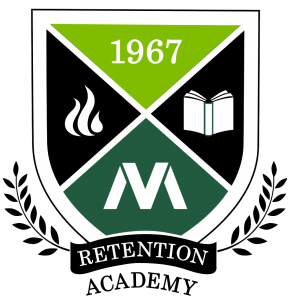The Retention Academy is an opportunity to:
Discover: Learn more about retention and barriers to retention that our students face
Inquire: Explore a research-based project that is relevant and specific to participants’ interests
Inspire: Share findings and best practices with colleagues
Moraine Valley Retention Academy Findings

A total of eight projects (three group and five individual) were completed to fruition. Below are some key findings from each of the projects.
View the full report Retention Academy Findings
Assessing the Deregistration Process on Student Acquisition and Retention
Author: Mike Loveday
- Current college policy de-registers students from their courses if payment is not made by midnight of the same day. This project examined the data for students being deregistered from their courses to assess the impact on future enrollments. Based on the sample size of over 46,000 students, findings showed the deregistration process to have little impact on whether students eventually enroll in classes. However, it is unclear whether students were able to enroll in the exact courses for which they were initially enrolled. Future directions for this project would examine this further, as well as examining whether this policy had a greater impact on particular demographic groups more than others.
Early Alert Interventions: Retention Alert at Moraine Valley
Author: Shanya Gray
- Early alert systems are used to intervene with students at risk of failing early in the semester. This research reviews the Early Alert system that has existed at the college since 2011, examines best practices and implements an improvement plan to enhance the system and improve the likelihood that a student referred for early alert will pass a class and remain in good standing at the end of the semester. Interventions included gaining instructor and student buy-in and a more comprehensive assessment of students’ risk factors. Results from the intervention were promising, showing a 32% decrease in students going on academic restriction from spring 2017.
Examining the Impact of Scheduling on Student Retention and Degree Completion
Author: Laura Earner
- Findings from this project indicated that students’ class schedules included more than 250 distinct meeting patterns in fall 2018. Quantitative information was gleaned from Ad Astra software and Colleague about scheduling patterns and qualitative data was gathered from Moraine Valley advisors and counselors. Reasons for the high number of meeting patterns include using nonstandard section start/end times, nonstandard day of the week patterns and offering hybrid classes during traditional peak classroom times. Based on the findings, a Strategic Scheduling Committee was formed to look at practices in place, and during the next academic year, consider implementing scheduling policies/practices that will be adopted by all departments to create a more standardized schedule for students.
Helping Faculty Increase Retention among African-American Male Students
Author: Amy Lubke
- The researcher of this project conducted interviews with African-American male students to gather feedback regarding keys and barriers to success and specifically what more instructors can do to assist them. This feedback was taken to Humanities faculty, and a plan was developed to implement strategies that addressed the comments from the interviews. Some strategies included individualized attention and support for students and review games. After implementation of these strategies in spring 2019, the course section implementing these strategies saw an increase in the number of African-American male students who earned an A, B, or C in the course, compared to before the intervention was implemented.
Impactful Interventions for Students on Academic Probation
Authors: Teresa Hannon & Matthew Cullen
- This group project took a closer look at developing and measuring the success of a more focused and structured approach for counseling students on Academic Probation. Part of this new approach included helping students develop realistic and attainable educational goals, helping students understand college culture, and reviewing key supportive services with students. Another approach implement
ed during this process was to use a digital form for all academic restriction interventions, as opposed to a paper form, thereby ensuring counselors’ consistent access to the same information. Findings from the project show that students who received the new, more structured approach were more likely to re-enroll at the college compared to those who did not receive this approach.
Improving Online In-Course Success Rates
Authors: Dr. Cindy Anderson, Dr. Sara Gallagher, & Jim Snooks
- This group project focused on improving success rates in online courses; college enrollment in online courses have been trending upwards for several years, but success rates have not been as high.
- A “Getting Started” module was added to Canvas to help students better prepare for online classes, leading to an increase in retention and better grades in those classes. Eleven courses participated in the study, showing the aggregate in-course success rate for grades and retention rates improved 6.21% and 4.45% respectively after the implementation of the module. The module taught students how to use Canvas, the college’s learning management system, offered advice about time management and provided tips for dealing with lack of preparedness.
Increasing Student Retention in General Education Math by Eliminating Online Withdrawal
Authors: Dr. Amy Madden & Frank Johnson
- This group project focused on increasing retention in General Education Math (Math 120) by only allowing students to withdraw from the course after they have spoken to an instructor or Student Success Specialist and obtaining their signature. This is contrary to the college policy of allowing students to self-service withdraw from any of their courses. By intentionally introducing this barrier, faculty hoped to dissuade some students who were planning to withdraw without considering all of the consequences, as well as provide additional support and resources to struggling students. Results from this project showed a decrease in the withdrawal rate by 2% after implementing this policy.
Student Success in Medical Terminology Courses
Author: Colette Schrank
- The MRT-110 medical terminology class is a foundation course serving as either a prerequisite or a co-requisite for every Allied Health program at Moraine Valley. This project focused on the issue of the number of students failing the final exam. Approximately 24% of the students failed the final exam during the fall 2016 and spring 2017 semesters. Of those, 46% earned a D or an F in the class. Data suggested the higher the score in Reading 091, the greater likelihood of comprehension and recall of the medical terms and in demonstrating that knowledge on the exam. Next steps for this project include meeting with the college’s Curriculum Development & Curriculum Review Committees to review the data and request a new minimum of “B” in RDG-091 & IEL-096 before registering for MRT-110.
Moraine Valley Retention Academy Video
The Moraine Valley Retention Academy is possible through generous funds from the MVCC Foundation Innovation Grant

